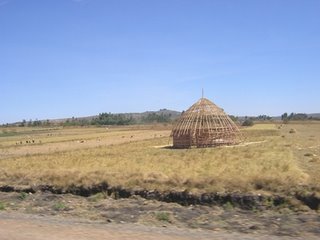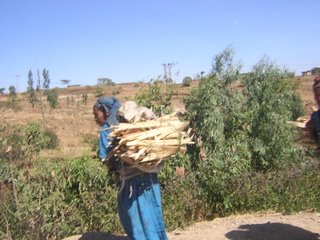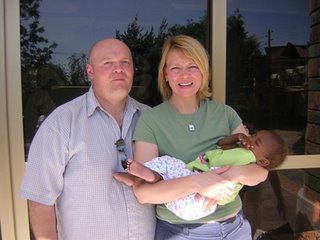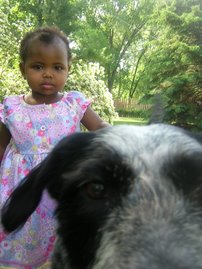 Today we went to Hosaina, a city 230 km southwest of Addis Ababa. The drive is exceptional . . . All of the families – 5 Land Rovers full- who chose to go got started at 5 a.m. It only took 3.5 hours to get there . . . The roads out of town are really quite good; the driving is good also, just a little on the ‘we don’t really follow the rules.’ After cresting hills in the left lane, almost hitting several people, goats, dogs and donkeys, we came to the part of the road that is under construction. Cones aren’t used, rocks are. The detours are really dusty, crazy curvy and just a bit rough. OK, more like the roughest road I have ever seen. All those hours riding across the plains of Montana in a ¾ ton came in handy. We slowed down though this town because of goats,
Today we went to Hosaina, a city 230 km southwest of Addis Ababa. The drive is exceptional . . . All of the families – 5 Land Rovers full- who chose to go got started at 5 a.m. It only took 3.5 hours to get there . . . The roads out of town are really quite good; the driving is good also, just a little on the ‘we don’t really follow the rules.’ After cresting hills in the left lane, almost hitting several people, goats, dogs and donkeys, we came to the part of the road that is under construction. Cones aren’t used, rocks are. The detours are really dusty, crazy curvy and just a bit rough. OK, more like the roughest road I have ever seen. All those hours riding across the plains of Montana in a ¾ ton came in handy. We slowed down though this town because of goats,  and these guys with sickles scared the living begezzus out of us. The consensus is that they were just screwing with people, because some of the drivers laughed, but still . . . not cool. But if I were them, I might do the same.
and these guys with sickles scared the living begezzus out of us. The consensus is that they were just screwing with people, because some of the drivers laughed, but still . . . not cool. But if I were them, I might do the same.After we arrived in Hosaina, we grouped up at a hotel and took a bathroom break. A few ladies braved the elements of the facility. I felt the blessing of being male. . . talk about yeck. Then you find out it is the best they have in town . . . Then we rolled to the intake center . . . where Mesay began her time with children’s home. The center is small; if I recall correctly, five rooms where the children are staying. We first went into the main play/activity room . . . the looks on the faces varied from shock to excitement . . .
It is now Monday evening . . . we were so wiped out yesterday, that we couldn’t finish the update. I may be a little redundant here, but the computer I started the update on is being used by another person, so I’m punting as to where to start.
 Been here two days, feels like two weeks, if not longer. That’s in a good way.
Been here two days, feels like two weeks, if not longer. That’s in a good way.The intake center in Hosaina is a lot to take. You are seeing children whose world has just shattered, no matter how poor that life may have been. The poverty is endemic . . . you almost begin to get used to it; it wears you down. These kids just stare at you . . . perhaps the first white person many have seen, if they weren’t there during the last tour. The local kids surround the outside of the compound, begging, asking for money. When we came in, we were given a tour. We didn’t know, but the family members were already there. (Julia and I will be meeting Almaz, Mesay’s birth mother on Thursday in Addis.) The other five families all had a least one member there. Julia and I helped the other families with photographs and video tape . . . we were pretty busy.We couldn’t help overhear many of the stories and conversations, which I will not share out of respect for privacy of everyone concerned. It was remarkable to see each family start a relationship with these people who had to make tremendous sacrifices or who happened upon a child and took the responsibility to bring the child to the intake center. Each family had a different experience, of course, but all said it was worth the trip and the expense. It was emotionally exhausting.
The trip back to Addis was another experience of Ethiopian Driving. This time, however, people were out going about their daily work. I never envisioned the country so densely populated. Only the high mountain pass 30km south of Addis did not have people at least walking by the side of the road. I took lots of video of the drive both ways. I don’t know if you’ll be able to see anything, but you may see some near hits. Remarkably in the 230 km we had seen only one goat and dog who found the driving fatal. I don’t know how there are not hundreds are killed on that highway everyday.

We stopped for some photographs . . . the country, people, houses and animals are all so beautiful. You are at 7700 feet here in Addis and 9 degrees latitude. It really is a fantastic climate. My vision of what Ethiopia looked like was formed by impressions of the famine in the 1980s. It is so lush. The grain fields stretch up the hills, terraced. There were people out harvesting, with a sickle, threshing with sticks and cattle, and finally chaffing with a basket. I remember the films from seventh grade, but seeing it in person was unbelievable. I don’t know if I captured it all on the video, but the images will stay burned into my mind for as long as I can hold onto it. I just hope I can share. The most important thing is that Mesay is from this part of the world. It is my every intention and desire that she develops a great love and respect for the land and most importantly the people of her birth.

After we got back, all the families headed to the care center to see the children. Mesay was very upset and just limp. It was quit disconcerting. . . I don’t know if she was upset with us or having really serious problems. We were only able to spend an hour and a half with her and then we had to go to the airport to see if our luggage had arrived. Mossi, the center’s head driver and fix-it man, took us to Bole as there was another couple coming in. An experience I am trying to put in perspective what happened: You have to pay an admittance fee to Bole, as we were standing in the line to have the military look at our passports, a disturbance broke out. A man, who Mossi said was on chat, broke a way from a solider. The soldiers then pursued the man around the parking lot, for a second they were running right at us. The caught the man, pushed him to the ground and beat him with batons. Although the people who were in line strained to look, the line did not break. We remained calm, Mossi with a reassuring smile on his face, but the real story in his eyes. After calm settled Mossi whispered that the soldiers were looking for Somali names, as that situation has changed for the worse. WE got through the passport check and then lined up for the civilian security. Every bag and person passes through security at Bole at the main doors. (That’s going to be interesting and a pain when we go to leave on Saturday). We made it through the x-ray unscathed, dashed straight to the luggage area, went backwards through customs, and straight to the baggage claim. Long story short, our luggage got here Saturday. NWA sent it KLM … “we were going to call you” said the Ethiopian baggage claim clerk, “but didn’t get around to it.” That’s OK by me, we have our stuff! All of Ella Mesay’s clothes and baby stuff . . . just wonderful, all the donations. I gave Zach one of the soccer balls to take to the school this morning, he was very excited about it.
We had to wait about two hours for the other couple to land, get visaed and clear customs. We had a nice little drive to the Hilton, and got back here around 10 p.m. I tried to blog and you see above how far I got. So ends Sunday.
Monday, December 11, 2006
For keeps

After our late-afternoon visit with Mesay yesterday, we resolved that today was the day we would keep her with us for good! (There is some diplomacy required here, as the nannies have formed such important bonds with the children and of course have great info on each child’s temperament, desires, and needs.) All families had appointments with Dr. Freiwhot to go over our children’s medical info in the morning. Mesay continued to be pretty listless and ‘checked-out’ at first, just not responding to us much, and refusing all food at the big chaotic toddler lunch. While we were waiting for our turn to see the doctor, she fell asleep in my arms. She slept like that for at least an hour, and woke up while in the doctor’s office. (The doctors assured us that she was doing very well.) At the very end of the visit, she suddenly chuckled. I have never been so happy to hear someone laugh in my life! For the rest of the afternoon, as the entire bunch of us took a tour of the several CHSFS sites, schools, and residence halls (more on that later), she became increasingly smiley, sunny, happy, giggly, silly, and chatty. Everyone commented on it!
 She babbled in the crowded van, she giggled and blew kisses at me, she chewed on my sunglasses, chuckled and squealed as Kent tickled her. We also gave her a quick bath when we got back to the guest house – a classic CHSFS Guest House adoption trip experience, as I had several helpful hands from other (much more experienced) parents, fetching the bucket of warm water, teaching me how to use the tub/changing table, in a hallway full of other kids, adults and a couple of plumbers working on a leaky toilet down the hall. The nannies must bathe everyone standing up, because she refused to sit down, and wasn’t very pleased with the process until we got to the warm oil rub down.
She babbled in the crowded van, she giggled and blew kisses at me, she chewed on my sunglasses, chuckled and squealed as Kent tickled her. We also gave her a quick bath when we got back to the guest house – a classic CHSFS Guest House adoption trip experience, as I had several helpful hands from other (much more experienced) parents, fetching the bucket of warm water, teaching me how to use the tub/changing table, in a hallway full of other kids, adults and a couple of plumbers working on a leaky toilet down the hall. The nannies must bathe everyone standing up, because she refused to sit down, and wasn’t very pleased with the process until we got to the warm oil rub down.Lunch at the Guest House is our biggest meal of the day. It is Hiroot’s shining moment as a cook. Today’s lunch was classic Ethiopian food- injera (the best I’ve had- much thinner and lighter), doro wat (spicy chicken stew), shira wat (spicy beef stew), and spicy red lentils. Mesay sat on my lap and ate everything. The girl likes her food spicy! She also liked the Ethiopian version of flan--- denser, with a nearly burnt sugar crust.
 Yum! We drink a lot of bottled water here, and Ethiopian Coke and Pepsi, and a local beer called St. George’s.
Yum! We drink a lot of bottled water here, and Ethiopian Coke and Pepsi, and a local beer called St. George’s.We’ve noticed that the toddlers are quite well-behaved, but the nannies also do a lot for them. Most every child is hand-fed. Kent and I have stepped in to help out at lunch, and it’s like trying to keep a nest of baby birds happy!
Something I meant to mention before:
Her name is pronounced more like “mah-Sai” or “m’Sai” than Meh-say. When the nannies put the affectionate “ay-ye” on the end, it sounds like “M’Sai-yai-ye” said in a sing-song-y tone.

2 comments:
What a great adventure; eagerly awaiting another installment! Can't wait to meet Mesay. So glad the luggage turned up.
Thanks for sharing your experience. I am so anxious to meet your daughter...my niece!!
Have been sharing your blog with everyone around here. We all send our love and prayers for safe traveling. You are going to be the best parents..
Love,
Penny and family
Post a Comment